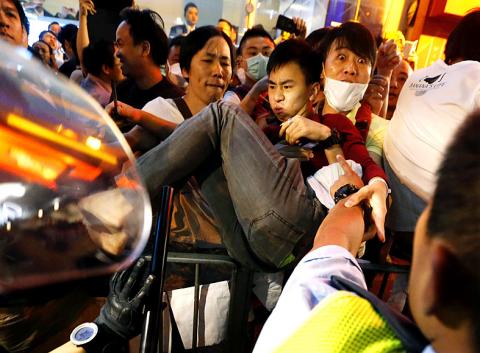Hong Kong riot police used pepper spray and baton-charged crowds of pro-democracy protesters last night as tension escalated after a pre-dawn clearance of a major protest zone in the Chinese-controlled financial hub.
Crowds of protesters headed to the gritty and congested Mong Kok district after work and school last night, across the harbor from the heart of the civil disobedience movement near government headquarters, to try to reclaim sections of an intersection that police had cleared in a surprise raid early yesterday morning.
Hundreds of protesters tried to break through police lines and they used open umbrellas to shield themselves from pepper spray. In the melee, police used batons and scuffled violently with activists.

Photo: Reuters
Police hauled off several protesters as others shouted insults and chanted “open the road.”
The protesters, led by a restive generation of students, have been demanding that the China’s rulers live up to constitutional promises to grant full democracy to the former British colony, which returned to Chinese rule in 1997.
Before dawn yesterday, hundreds of police officers staged their biggest raid yet on a pro-democracy protest camp, charging down student-led activists who had held the intersection in one of their main protest zones for more than three weeks.
The operation came while many protesters were asleep in dozens of tents or beneath giant, blue-striped tarpaulin sheets.
The raid was a gamble for the 28,000-strong police force, who have come under criticism for aggressive clearance operations with tear gas and baton charges and for the beating of a handcuffed protester on Wednesday.
Storming into the intersection with helmets, riot shields and batons at the ready from four directions, the 800 officers caught the protesters by surprise. Many retreated without resisting.
“The Hong Kong government’s despicable clearance here will cause another wave of citizen protests,” radio talk-show host and activist Wong Yeung-tat (黃洋達) said earlier.

AGING: As of last month, people aged 65 or older accounted for 20.06 percent of the total population and the number of couples who got married fell by 18,685 from 2024 Taiwan has surpassed South Korea as the country least willing to have children, with an annual crude birthrate of 4.62 per 1,000 people, Ministry of the Interior data showed yesterday. The nation was previously ranked the second-lowest country in terms of total fertility rate, or the average number of children a woman has in her lifetime. However, South Korea’s fertility rate began to recover from 2023, with total fertility rate rising from 0.72 and estimated to reach 0.82 to 0.85 by last year, and the crude birthrate projected at 6.7 per 1,000 people. Japan’s crude birthrate was projected to fall below six,

US President Donald Trump in an interview with the New York Times published on Thursday said that “it’s up to” Chinese President Xi Jinping (習近平) what China does on Taiwan, but that he would be “very unhappy” with a change in the “status quo.” “He [Xi] considers it to be a part of China, and that’s up to him what he’s going to be doing, but I’ve expressed to him that I would be very unhappy if he did that, and I don’t think he’ll do that. I hope he doesn’t do that,” Trump said. Trump made the comments in the context

SELF-DEFENSE: Tokyo has accelerated its spending goal and its defense minister said the nation needs to discuss whether it should develop nuclear-powered submarines China is ramping up objections to what it sees as Japan’s desire to acquire nuclear weapons, despite Tokyo’s longstanding renunciation of such arms, deepening another fissure in the two neighbors’ increasingly tense ties. In what appears to be a concerted effort, China’s foreign and defense ministries issued statements on Thursday condemning alleged remilitarism efforts by Tokyo. The remarks came as two of the country’s top think tanks jointly issued a 29-page report framing actions by “right-wing forces” in Japan as posing a “serious threat” to world peace. While that report did not define “right-wing forces,” the Chinese Ministry of Foreign Affairs was

PREPAREDNESS: Given the difficulty of importing ammunition during wartime, the Ministry of National Defense said it would prioritize ‘coproduction’ partnerships A newly formed unit of the Marine Corps tasked with land-based security operations has recently replaced its aging, domestically produced rifles with more advanced, US-made M4A1 rifles, a source said yesterday. The unnamed source familiar with the matter said the First Security Battalion of the Marine Corps’ Air Defense and Base Guard Group has replaced its older T65K2 rifles, which have been in service since the late 1980s, with the newly received M4A1s. The source did not say exactly when the upgrade took place or how many M4A1s were issued to the battalion. The confirmation came after Chinese-language media reported